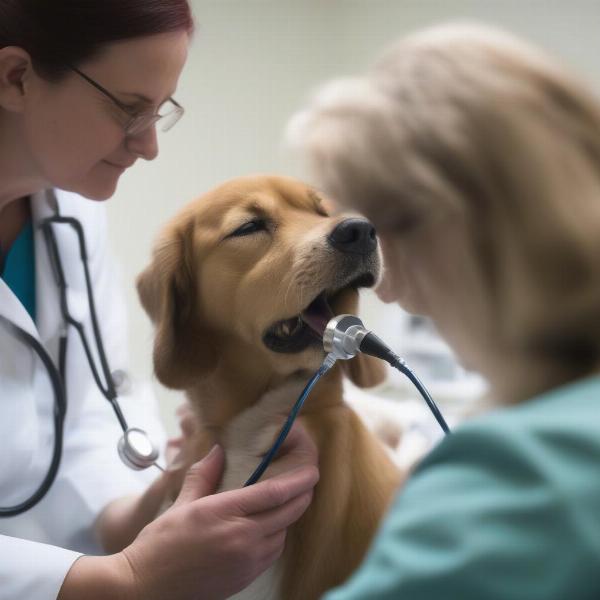Sleepwalking, that curious nocturnal behavior we often associate with humans, can leave us wondering if our canine companions experience it too. Do dogs sleepwalk? While it’s not quite the same as what we see in people, dogs can exhibit behaviors during sleep that might resemble sleepwalking. This article explores the fascinating world of canine sleep, examining these behaviors and helping you understand what’s normal and what might warrant a visit to the vet.
Understanding Canine Sleep Cycles
Like humans, dogs experience different stages of sleep: light sleep, deep sleep, and REM (rapid eye movement) sleep. It’s during these various stages that different behaviors can occur. During light sleep, dogs might twitch, whimper, or even change position. Deep sleep is more restful, and your dog will be less responsive to external stimuli. REM sleep is when dreaming occurs, and you might notice your dog’s eyes moving rapidly beneath closed lids, paws twitching, and even soft barks or whimpers.
What Looks Like Sleepwalking in Dogs
While true sleepwalking, where a dog gets up and walks around while fully asleep, is extremely rare if it exists at all, certain sleep behaviors can be mistaken for it. These include:
- Twitching and Paddling: Often seen during REM sleep, these movements are perfectly normal and are likely associated with dreaming. Imagine your dog chasing squirrels in its sleep!
- Whining and Barking: These vocalizations can also occur during dreaming and are generally nothing to worry about.
- Sudden Movements: A dog might suddenly jerk or lift its head during light sleep. This is usually a normal sleep transition and not a cause for concern.
- Sleep Starts: Similar to humans experiencing hypnic jerks, dogs can have sudden muscle contractions that might startle them awake.
When to Consult a Veterinarian
Most sleep behaviors in dogs are completely normal. However, there are a few instances where it’s a good idea to consult a veterinarian:
- Excessive Vocalization or Movement: While some sounds and twitches are normal, excessive or prolonged episodes might indicate a sleep disorder or an underlying medical condition.
- Aggression During Sleep: If your dog becomes aggressive when woken from sleep, it’s important to seek professional advice. This could be a sign of a neurological issue.
- Seizures: It’s crucial to differentiate between normal sleep movements and seizures. Seizures often involve rhythmic jerking, loss of consciousness, and other symptoms. If you suspect your dog is having seizures, contact your vet immediately.
 Dog at Vet Checkup
Dog at Vet Checkup
Creating a Restful Sleep Environment for Your Dog
A comfortable and safe sleep environment can promote healthy sleep patterns in your dog. Consider providing:
- A comfortable bed: dog boarding ipswich provides information on dog boarding facilities that prioritize restful sleep environments.
- A quiet and dark space: Minimize distractions and noise.
- A consistent sleep schedule: Regular sleep and wake times can help regulate your dog’s circadian rhythm.
- Plenty of exercise and mental stimulation during the day: A tired dog is more likely to sleep soundly.
Conclusion
While true sleepwalking in dogs is highly unlikely, understanding their normal sleep behaviors can help you differentiate between what’s typical and what might require veterinary attention. By providing a comfortable sleep environment and monitoring for any unusual changes, you can ensure your furry friend enjoys peaceful slumbers. Can dogs sleepwalk? Probably not in the human sense, but their sleep world is just as fascinating! For more information on dog health and behavior, you can visit dog kennels cork.
FAQ
- Do dogs dream? Yes, dogs experience REM sleep, the stage associated with dreaming.
- Is it normal for my dog to twitch in its sleep? Yes, twitching and paddling are common during REM sleep and are usually related to dreaming.
- Should I wake my dog if it’s having a nightmare? It’s generally best not to wake a dog during a nightmare, as they could be disoriented and potentially react defensively. If the nightmares are frequent or severe, consult your vet.
- How much sleep does a dog need? The amount of sleep a dog needs varies depending on age, breed, and activity level, but most adult dogs sleep between 12 and 14 hours a day.
- What are signs of a sleep disorder in dogs? Signs might include excessive vocalization, restlessness, aggression during sleep, and difficulty waking up.
- Can medications cause sleep disturbances in dogs? Certain medications can affect a dog’s sleep. Consult your vet if you suspect your dog’s medication is causing sleep problems.
- How can I help my dog sleep better? Establishing a consistent routine, providing a comfortable bed, and ensuring a quiet and dark sleep environment can all contribute to better sleep. For more information on dog products that can promote better sleep, you may refer to dog hoodie supreme.
Related Articles
You may find these articles on ILM Dog helpful: congratulations dog and last minute cottage holidays with dogs.
About ILM Dog
ILM Dog is your trusted international resource for all things dog-related. We offer expert advice on dog breeds, health, training, nutrition, grooming, and more. Whether you’re a new dog owner or a seasoned pro, ILM Dog provides practical and reliable information to help you provide the best possible care for your canine companion. Our expertise covers everything from breed selection and healthcare to training techniques and product recommendations, ensuring your dog’s well-being. Contact us for personalized advice: email us at [email protected] or call us at +44 20-3965-8624.